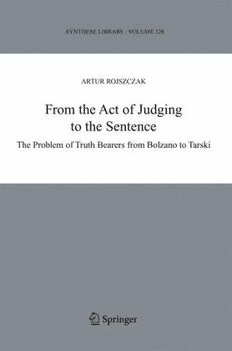
From the Act of Judging to the Sentence: The Problem of Truth Bearers from Bolzano to Tarski PDF
246 Pages·2005·2.954 MB·English
Most books are stored in the elastic cloud where traffic is expensive. For this reason, we have a limit on daily download.
Preview From the Act of Judging to the Sentence: The Problem of Truth Bearers from Bolzano to Tarski
Description:
This book offers a detailed study of the truth-bearers problem, that is, the question of which category of items the predicates ‘true’ and ‘false’ are predicated. The book has two dimensions: historical and systematic. Both focus around Tarski’s semantic theory of truth. The author locates Tarski’s ideas in a broad context of Austrian philosophy, in particular, Brentano’s tradition. However, Bolzano and phenomenology (Husserl and Reinach) are also taken into account. The historical perspective is completed by showing how Tarski was rooted in Polish philosophical tradition originated with Twardowski and his version of Brentanism. The historical considerations are the basis for showing how the idea of truth-bearers as acts of judging was transformed into the theory of truth-bearers as sentences. In particular, the author analyses the way to nominalism in Polish philosophy, culminating in Lesniewski, Kotarbinski and Tarski. This book is indispensable for everybody interested in the evolution of Austrian philosophy from descriptive psychology to semantics. It is also a fundamental contribution toward a deeper understanding of the philosophical background of Tarski’s theory of truth.
See more
The list of books you might like
Most books are stored in the elastic cloud where traffic is expensive. For this reason, we have a limit on daily download.
